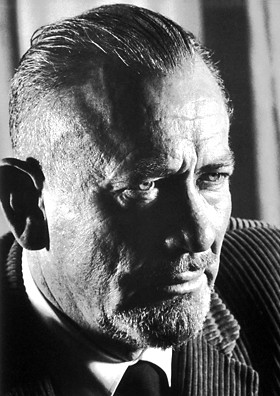John Steinbeck Frases famosas
Citações de homens de John Steinbeck
John Steinbeck frases e citações
Travels with Charley: In Search of America
Tortilla Flat
The Grapes of Wrath
John Steinbeck: Frases em inglês
“Nearly everybody has his box of secret pain, shared with no one.”
Fonte: East of Eden
Variante: But I have a new love for that glittering instrument, the human soul. It is a lovely and unique thing in the universe. It is always attacked and never destroyed - because 'Thou mayest.
Fonte: East of Eden
“The clouds appeared and went away, and in a while they did not try anymore.”
Fonte: The Grapes of Wrath
Fonte: Travels with Charley: In Search of America
“I know three things will never be believed - the true, the probable, and the logical”
Fonte: The Winter of Our Discontent
Fonte: Travels with Charley: In Search of America
“You're buying years of work, toil in the sun; you're buying a sorrow that can't talk.”
Fonte: The Grapes of Wrath
Variante: And this I believe: that the free, exploring mind of the individual human is the most valuable thing in the world. And this I would fight for: the freedom of the mind to take any direction it wishes, undirected.
Fonte: East of Eden (1952)
Contexto: And this I believe: that the free, exploring mind of the individual human is the most valuable thing in the world. And this I would fight for: the freedom of the mind to take any direction it wishes, undirected. And this I must fight against: any religion, or government which limits or destroys the individual. This is what I am and what I am about.
Contexto: Our species is the only creative species, and it has only one creative instrument, the individual mind and spirit of a man. Nothing was ever created by two men. There are no good collaborations, whether in art, in music, in poetry, in mathematics, in philosophy. Once the miracle of creation has taken place, the group can build and extend it, but the group never invents anything. The preciousness lies in the lonely mind of a man.
And now the forces marshaled around the concept of the group have declared a war of extermination on that preciousness, the mind of man. By disparagement, by starvation, by repressions, forced direction, and the stunning blows of conditioning, the free, roving mind is being pursued, roped, blunted, drugged. It is a sad suicidal course our species seems to have taken.
And this I believe: that the free, exploring mind of the individual human is the most valuable thing in the world. And this I would fight for: the freedom of the mind to take any direction it wishes, undirected. And this I must fight against: any religion, or government which limits or destroys the individual. This is what I am and what I am about. I can understand why a system built on a pattern must try to destroy the free mind, for it is the one thing which can by inspection destroy such a system. Surely I can understand this, and I hate it and I will fight against it to preserve the one thing that separates us from the uncreative beasts. If the glory can be killed, we are lost.
“And now, our submarines are armed with mass murder, our silly, only way of deterring mass murder.”
Pt. 1
Travels With Charley: In Search of America (1962)
Letter to his literary agent, found on his desk after his death in 1968
Writers at Work (1977)
The Winter of Our Discontent (1961), unplaced by chapter
Journal entry (11 June 1938), published in Working Days : The Journals of The Grapes of Wrath, 1938-1941 (1990) edited by Robert DeMott
Paris Review - The Art of Fiction No. 45 (1969)
The Winter of Our Discontent (1961), unplaced by chapter
“You ain't worth a greased lack pin to ram you into hell.”
Fonte: Of Mice and Men (1937), Ch. 6, p. 101
Friend Ed to Joe Saul in Act Three, Scene I: The Sea
Burning Bright (1950)
“Syntax, my lad. It has been restored to the highest place in the republic.”
When asked his reaction to John F. Kennedy’s inaugural address
Quoted by Atlantic magazine (November 1969)
Pt. 3
Travels With Charley: In Search of America (1962)
Nobel Prize acceptance speech (1962)
